A HIGH FLYING, ADORED REVIVAL
Composer Sir Andrew Lloyd Webber and lyricist Tim Rice released the Evita “rock opera concept album” in 1976, a few years before the first theatrical production came to life on the West End and ultimately Broadway, a production that I vividly remember. It was truly exhilarating to witness Patti LuPone and Mandy Patinkin’s electric star turns, Hal Prince’s glorious broad-stroke staging, and the very talented Larry Fuller’s choreography – which rarely slowed long enough to let you consider the short-comings of the material. It won just about every major award that year, yet was never given a Broadway revival until recently.
Michael Grandage’s splashy but sober production opened last year with Ricky Martin as the draw, enough to generate a lot of business. But his fan base wore out quickly and his lack of acting chops made for an unremarkable performance. Regardless, the reviews were decidedly mixed, and the show shuttered in the red after 46 weeks.
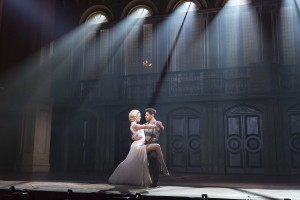 Well, a little bit of a miracle came rolling into Hollywood this week: With across-the-board hot performers, a streamlined National Tour of that revival substantiates how boffo talent combined with a sizzling score can go a long way in the theater. Grandage’s scaled-down bus-and-truck version is one of the most satisfying experiences I have had at the Pantages in years.
Well, a little bit of a miracle came rolling into Hollywood this week: With across-the-board hot performers, a streamlined National Tour of that revival substantiates how boffo talent combined with a sizzling score can go a long way in the theater. Grandage’s scaled-down bus-and-truck version is one of the most satisfying experiences I have had at the Pantages in years.
For those very few people who may not know, Evita concentrates on the life of Argentine political leader Eva Perón (1919- 1952), the second wife of Argentine president Juan Perón. The story follows her early life, rise to power, charity work, and early death. In Rice’s libretto, Eva, while not completely historically accurate, is an appealing main character for a musical: larger than life, sometimes opportunistic, sometimes altruistic, and always divisive.
Caroline Bowman turns out to be a fascinating Eva. For a tiny woman, she has an exceptionally powerful singing voice. What Bowman lacks in lower register (the ends of some of her songs are sung an octave higher than the original), she makes up for in her dancing and acting. She is a spitfire when she tangos, makes love, and manipulates all those around her. LuPone could move well, but Bowman is powerful and lithe with incredible eye-high leg kicks; when this old-fashioned triple-threat struts her stuff downstage she truly lights up the auditorium with “star quality.”
In Grandage’s revival, Che has been restored to the Greek Chorus role of the original text, and is no longer the beret-wearing historical Ernesto “Che” Guevara of Prince/Patinkin renown. This is a socially conscious Everyman who simply has disdain for the social climbing Eva. Josh Young lets his knockout voice and character nuances do the rest. His voice is warm and he sings the notes beautifully, orchestrating the rock breakout moments like a pro. He trusts the words and stands still to sell the songs without gesturing or indicating lyrics. His Che has the rich inner life created by a real actor, which is key to basic storytelling onstage.
Interestingly enough, I never missed Patinkin’s Che, who was smarmy, brutally furious and righteously indignant at Eva’s betrayal of her Marxist roots. Young’s lack of crossness and resentment actually makes the show more powerfully intimate. I have never – and I mean never – heard an audience at the Pantages so rapt and silent.
The rest of the cast is pitch-perfect. Sean MacLaughlin is superb with a rich voice as Perón; the fact that he is dashing and handsome actually gives weight to his romance with Eva. Krystina Alabado delivers the Mistress’s ballad, “Another Suitcase in Another Hall,” with the perfect blend of self-knowledge and heartbreak. And Christopher Johnstone finds the essence of Magaldi, the singer who is the first in a string of affairs Eva uses to get ahead; even though Johnstone has a gorgeous voice, we buy him at portraying a mediocre talent.
Grandage’s direction feels like staging without much of a point of view. At the top, I wondered why people were just standing around. But this is one of the most solid choruses I have seen: They sound great, dance up a storm, and each member creates a character with their own back story while never taking focus (this also gives the show a cinematic realism). Because most of Evita is music-driven, Grandage wisely defers to talented choreographer Rob Ashford who keeps the proceedings moving at a brisk pace – his slow-motion tango is inspired. Because there aren’t many dance numbers, the house is on fire when they do arrive (“And the Money Kept Rolling In”).
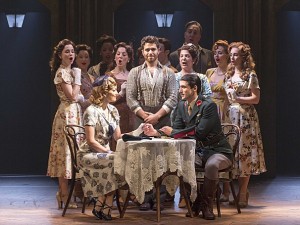 Christopher Oram’s simple set consists of a two-tiered backdrop: archways below and tall French Doors on the balcony above, with doorways that roll in and out. Though far less ornate, they resemble turn-of-the-century Buenos Aires when it reinvented itself as a Latin Paris (before the show begins, horrid blue curtains and giant disembodied bust-portraits of the first couple greet you like souvenir altar cards; these must be destroyed).
Christopher Oram’s simple set consists of a two-tiered backdrop: archways below and tall French Doors on the balcony above, with doorways that roll in and out. Though far less ornate, they resemble turn-of-the-century Buenos Aires when it reinvented itself as a Latin Paris (before the show begins, horrid blue curtains and giant disembodied bust-portraits of the first couple greet you like souvenir altar cards; these must be destroyed).
The overall sepia-tinged design (with scads of dry ice beautifully and sharply lit by Neil Austin) gave the show a look of dusty old photographs (projection designer Zachary Borovay successfully utilizes actual footage of Eva-loving throngs). Oram’s greenish-gray costumes – except for Eva, a priest and some nurses all in white — hit their mark perfectly, as do Richard Mawbey’s fun progression of Bowman’s wigs from black to blonde.
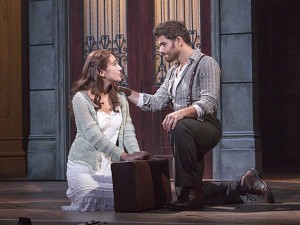 Still, we are left to contemplate the score and libretto. Even though Webber had not quite reached the peak of his powers with Evita, he had learned to write eclectic music without the songs feeling like pastiches. He mastered wrapping an entire score around the strains within a full, thematic melody. Say what you want about Webber as a commercial sell-out, he writes an authentic composition – all the way to the bank. Rice’s words remain efficient, often sly and witty, and the lyrics in “Rainbow High” (“Christian Dior me,” “Machiavell me,” “Lauren Bacall me”) all still land with a clever splash on the down-beat.
Still, we are left to contemplate the score and libretto. Even though Webber had not quite reached the peak of his powers with Evita, he had learned to write eclectic music without the songs feeling like pastiches. He mastered wrapping an entire score around the strains within a full, thematic melody. Say what you want about Webber as a commercial sell-out, he writes an authentic composition – all the way to the bank. Rice’s words remain efficient, often sly and witty, and the lyrics in “Rainbow High” (“Christian Dior me,” “Machiavell me,” “Lauren Bacall me”) all still land with a clever splash on the down-beat.
Still, even the most absorbed patrons got a tad restless later in Act Two when Juan breaks through Eva’s denial to confront her about her fatal illness; at this point, any hope of a theatrical dramatic story dies even as Eva takes her time doing so. Illness here is no substitute for dramatic action, and Eva’s death leaves the evening with no place to go in terms of a dramatic incident. Even though “You Must Love Me” from the movie version has been inserted, it isn’t the one last power ballad we need.
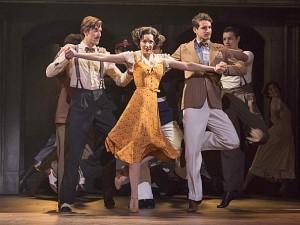 Updated orchestrations by Webber and David Cullen have a tango-rich sound flavored by bandoneóns, but I will always wonder why this revival didn’t grab the opportunity to update the second act with a truly transcendent moment. Quibbles aside, it’s hard to leave any production of Evita without the Webber melodies still playing in your head. And it cannot be denied that “Don’t Cry for Me Argentina” is one of the great set pieces in musical theater; Grandage is respectful of the moment, taking his time with the transformed Eva, who gracefully emerges from the smoke like a spirit, which allows the song to come forth unadorned. And when Eva sings “I’d Be Surprisingly Good for You,” she is accurately describing this tour.
Updated orchestrations by Webber and David Cullen have a tango-rich sound flavored by bandoneóns, but I will always wonder why this revival didn’t grab the opportunity to update the second act with a truly transcendent moment. Quibbles aside, it’s hard to leave any production of Evita without the Webber melodies still playing in your head. And it cannot be denied that “Don’t Cry for Me Argentina” is one of the great set pieces in musical theater; Grandage is respectful of the moment, taking his time with the transformed Eva, who gracefully emerges from the smoke like a spirit, which allows the song to come forth unadorned. And when Eva sings “I’d Be Surprisingly Good for You,” she is accurately describing this tour.
photos by Richard Termine
Evita
National Tour
reviewed at the Hollywood Pantages
ends on November 10, 2013
continues on tour through June, 2014
for info, visit Evita on Tour
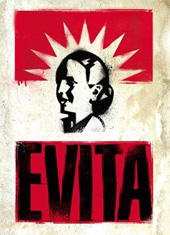
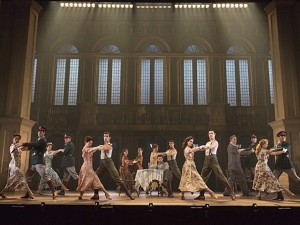
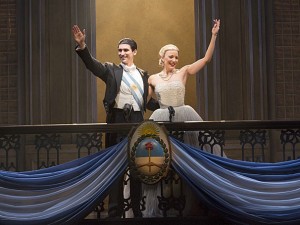
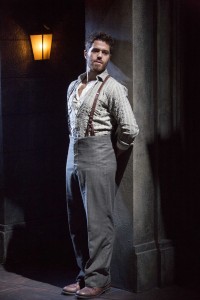
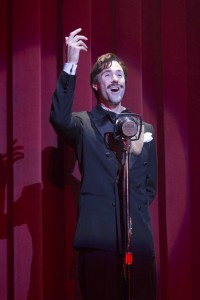

{ 1 comment… read it below or add one }
Excellent review, Tony. I agree with all your comments with the except of Sean MacLaughlin’s performance as Perón. Although Mr. MacLaughlin sings the role well, his diminutive stature and distracting youth undermine the commanding and imposing character that EVITA’s Perón requires. (BTW, the best Perón ever was the West End’s Philip Quast.)